最新人教版八年级下册英语Unit1知识点
- 格式:docx
- 大小:19.57 KB
- 文档页数:4
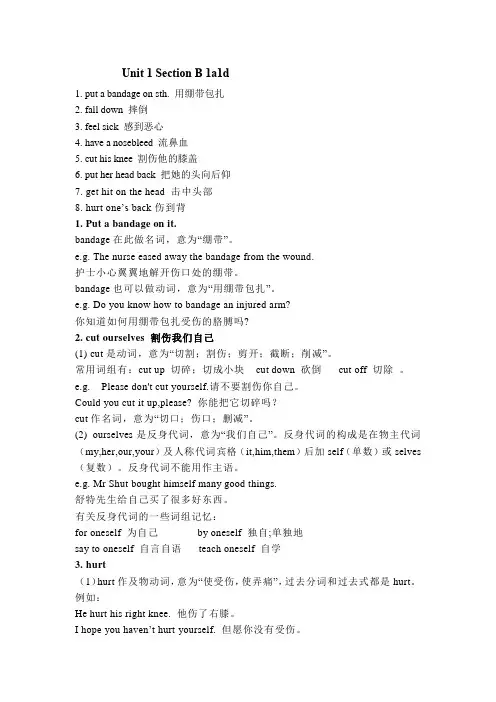
Unit 1 Section B 1a1d1. put a bandage on sth. 用绷带包扎2. fall down 摔倒3. feel sick 感到恶心4. have a nosebleed 流鼻血5. cut his knee 割伤他的膝盖6. put her head back 把她的头向后仰7. get hit on the head 击中头部8. hurt one’s back伤到背1. Put a bandage on it.bandage在此做名词,意为“绷带”。
e.g. The nurse eased away the bandage from the wound.护士小心翼翼地解开伤口处的绷带。
bandage也可以做动词,意为“用绷带包扎”。
e.g. Do you know how to bandage an injured arm?你知道如何用绷带包扎受伤的胳膊吗?2. cut ourselves 割伤我们自己(1) cut是动词,意为“切割;割伤;剪开;截断;削减”。
常用词组有:cut up 切碎;切成小块cut down 砍倒cut off 切除。
e.g. Please don't cut yourself.请不要割伤你自己。
Could you cut it up,please? 你能把它切碎吗?cut作名词,意为“切口;伤口;删减”。
(2) ourselves是反身代词,意为“我们自己”。
反身代词的构成是在物主代词(my,her,our,your)及人称代词宾格(it,him,them)后加self(单数)或selves (复数)。
反身代词不能用作主语。
e.g. Mr Shut bought himself many good things.舒特先生给自己买了很多好东西。
有关反身代词的一些词组记忆:for oneself 为自己by oneself 独自;单独地say to oneself 自言自语teach oneself 自学3.hurt(1)hurt作及物动词,意为“使受伤,使弄痛”,过去分词和过去式都是hurt。
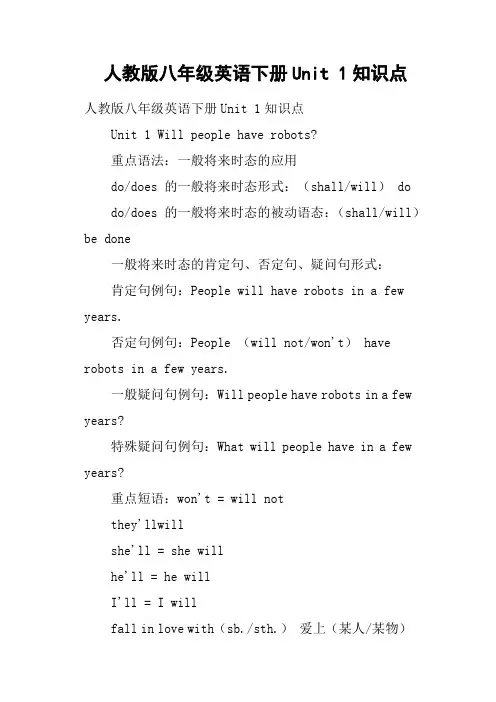
人教版八年级英语下册Unit 1知识点人教版八年级英语下册Unit 1知识点Unit 1 Will people have robots?重点语法:一般将来时态的应用do/does 的一般将来时态形式:(shall/will) dodo/does 的一般将来时态的被动语态:(shall/will)be done一般将来时态的肯定句、否定句、疑问句形式:肯定句例句:People will have robots in a few years.否定句例句:People (will not/won't) have robots in a few years.一般疑问句例句:Will people have robots in a few years?特殊疑问句例句:What will people have in a few years?重点短语:won't = will notthey'llwillshe'll = she willhe'll = he willI'll = I willfall in love with(sb./sth.)爱上(某人/某物)be able to do sth. 能够做某事come true 实现uture 未来hundreds of 数以百计的thousands of 数以千计的look for(sb./sth.)寻找(某人/某物)will → would 情态动词 will 的原形和过去式may → might 情态动词 may 的原形和过去式Reading Strategy(阅读方法)Look ale and picture, and predict what you will read about. (看着标题和图片,预知你要阅读那些方面的内容。
)This helps you get ready to acquire new information. (这样可以帮助你获得一些新的信息。
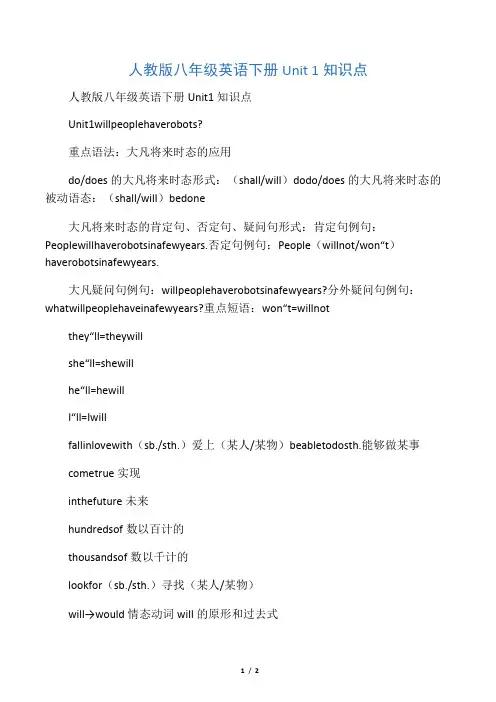
人教版八年级英语下册Unit 1知识点人教版八年级英语下册Unit1知识点Unit1willpeoplehaverobots?重点语法:大凡将来时态的应用do/does的大凡将来时态形式:(shall/will)dodo/does的大凡将来时态的被动语态:(shall/will)bedone大凡将来时态的肯定句、否定句、疑问句形式:肯定句例句:Peoplewillhaverobotsinafewyears.否定句例句:People(willnot/won“t)haverobotsinafewyears.大凡疑问句例句:willpeoplehaverobotsinafewyears?分外疑问句例句:whatwillpeoplehaveinafewyears?重点短语:won“t=willnotthey“ll=theywillshe“ll=shewillhe“ll=hewillI“ll=Iwillfallinlovewith(sb./sth.)爱上(某人/某物)beabletodosth.能够做某事cometrue实现inthefuture未来hundredsof数以百计的thousandsof数以千计的lookfor(sb./sth.)寻找(某人/某物)will→would情态动词will的原形和过去式1/ 2may→might情态动词may的原形和过去式ReadingStrategy(阅读方法)Lookatthetitleandpicture,andpredictwhatyouwillreadabout.(看着标题和图片,预知你要阅读那些方面的内容。
)Thishelpsyougetreadytoacquirenewinformation.(这样可以帮助你获得一些新的信息。
)2/ 2。
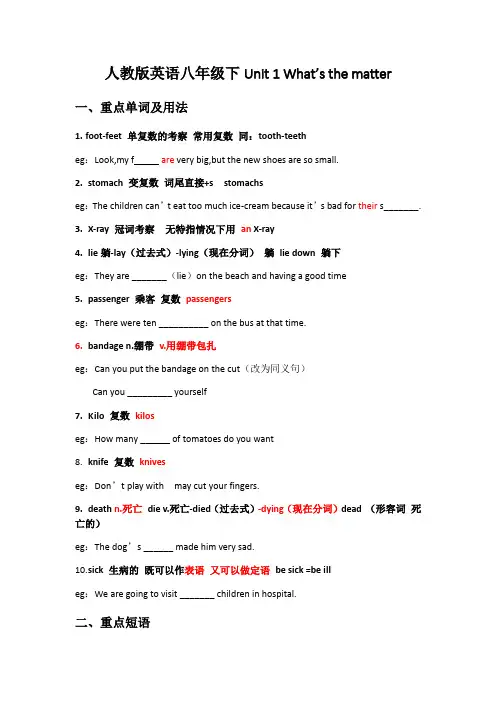
人教版英语八年级下Unit 1 What’s the matter一、重点单词及用法1.foot-feet 单复数的考察常用复数同:tooth-teetheg:Look,my f_____ are very big,but the new shoes are so small.2.stomach 变复数词尾直接+s stomachseg:The children can’t eat too much ice-cream because it’s bad for their s_______.3.X-ray 冠词考察无特指情况下用an X-ray4.lie躺-lay(过去式)-lying(现在分词)躺lie down 躺下eg:They are _______(lie)on the beach and having a good time5.passenger 乘客复数passengerseg:There were ten __________ on the bus at that time.6.bandage n.绷带v.用绷带包扎eg:Can you put the bandage on the cut(改为同义句)Can you _________ yourself7.Kilo 复数kiloseg:How many ______ of tomatoes do you want8.knife 复数kniveseg:Don’t play with may cut your fingers.9.death n.死亡die v.死亡-died(过去式)-dying(现在分词)dead (形容词死亡的)eg:The dog’s ______ made him very sad.10.s ick 生病的既可以作表语又可以做定语be sick =be illeg:We are going to visit _______ children in hospital.二、重点短语have a cold =catch a cold =have the flu 感冒cough 咳嗽lie down 躺下take one’s temperature 量体温have a fever 发烧take/have breaks/a break 休息=take/have a rest get off 下车-get on上车to one’s surprise 令某人惊讶的是right away 立刻马上=right now get into (trouble)陷入(麻烦)get sunburned 被晒伤be used to (doing)习惯于适应于...... take risks/a risk 去冒险run out (of)用完用尽cut off 切除get out of 离开从......出来be in control of 掌管管理give up (doing)放弃(做)某事have a stomachache 胃痛get an X-ray 做一个X射线检查thanks to......由于多亏in time 及时on time 准时think about 考虑think of认为fall down 摔倒make a decision 作决定put......on......把....放在...上be interested in 对...感兴趣三、用法总结1.need to do sth需要做某事eg: The teacher needs_____(rest) for a few minutes.like 意为“听起来像”后接n./adj./句子eg: It sounds like a good idea.类似的感官动词+like:feel like/smell like/ look like/taste like/seem likesound+adj. 结构中,sound 是系动词意为“听起来是”后接形容词eg:That sounds great.+n./doing(v.现在分词)He went to school without having breakfast. eg:He left the classroom without ________ anythingv.同意,赞成agree with sb/某人的意见看法Does she agree with usagree to do sth 同意做某事They agreed to solve the problem. problems (in) doing sth做某事有困难=have trouble/difficulty (in) doinghave problems with sth =have trouble/difficulty with sth 在某方面有困难eg:One of my good friends said he had problems__________(learn) English.get used to doing sth 习惯于做某事eg:He used to get up late,but now he is used to getting up early.used to do sth 过去常常做某事(现在不做了)eg:He used to read English in the evening.use sth to do sth 使用用某物做某事eg:So he used knife to cut off his arm.be used to do sth 被动被用于做某事eg:These new pens are used to paint the wall.one’s life 丧失生命save one’s life 挽救某人的生命eg:He lost his life in the car accident.adj.足够的充足的后接名词n. enough moneyadv.足够地修饰形容词/副词enough要后置eg:The book is_______,but I don’t have enough money ______it.interesting; to buy enough; to buyenough; buying interesting; buying9. the importance of (doing)sth (做)某事的重要性important adj.重要的unimportant adj.不重要的importance n.重要性eg:We students should know the importance of (learning)English.n.决定make a decision (to do sth)decide to do sth 决定做某事decide not to do sth 决定不做某事eg:Tom made a decision to study English well.up 放弃give up 是动词+副词结构接代词作宾语时代词放中间eg:The problem is so difficult for you,but don’t _______A.give it up it out up it out itgive up doing sth 放弃做某事eg:You will be very sad if you give up______(sing).用法keep on doing sth 继续做某事(中间有间隔强调重复性)eg:He kept on studying though he was very tired.keep doing sth 继续不停地做某事(不间断连续性)eg:Keep walking until you reach the end of the road.keep sb doing 让某人一直做某事eg:Don’t keep the other students waiting.keep sb from doing sth 阻止某人做某事eg:We should keep the little boy from stepping on the grass.用法find找到,强调寻找的结果look for强调寻找过程find out找出查明eg:I was looking for my watch,but I didn’t find it.find sb doing sth 发现某人正在做某事eg:When I walked along the road,I found an old man shouting for help.find it +adj形容词+to do sth 发现做某事是...的eg:She found it hard to finish the work by herself.risks=take a risk 冒险He likes taking risks.risk one’s life to do 冒着生命危险去做某事eg:He risked his life to save the child.risk doing stheg: The man called Tom often risks flying over the sea.四、短语辨析1.see sb doing sth 看见某人正在做某事(动作正在发生)see sb do sth 看见某人做某事(看到动作全过程或者经常看到动作发生)eg:I saw the boy crying when I passed by(路过).类似的hear/watch/notice/find+sb do/doing sththanks to 多亏... 由于....=with the help of/with one’s help=because ofthanks for 因.......而感谢强调感谢的原因eg:Thanks to my teacher ,I passed the exam.Thanks for your help .Thanks for inviting me.2.in time 及时表示动作在规定时间内或比规定时间提前发生on time 准时按时指正好在规定时间内eg:Thanks for coming here to help me in time.The train arrived into the station on time.火车准时进站了。
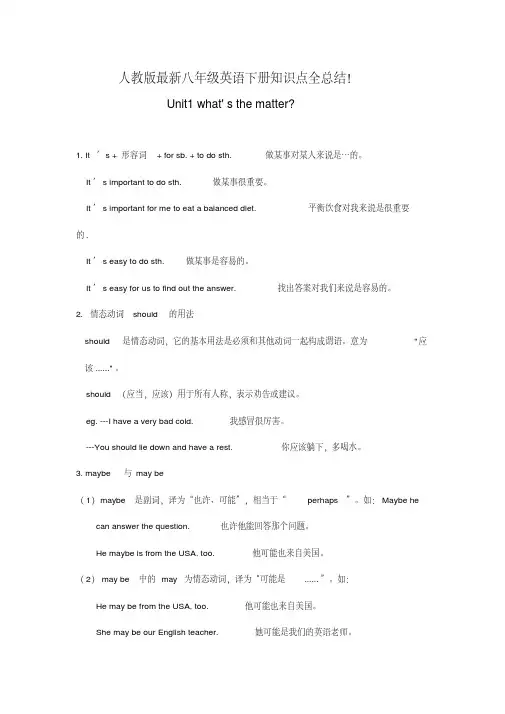
人教版最新八年级英语下册知识点全总结!Unit1 what' s the matter?1. It’s +形容词+ for sb. + to do sth. 做某事对某人来说是…的。
It’s important to do sth. 做某事很重要。
It’s important for me to eat a balanced diet. 平衡饮食对我来说是很重要的.It’s easy to do sth. 做某事是容易的。
It’s easy for us to find out the answer. 找出答案对我们来说是容易的。
2. 情态动词should的用法should是情态动词,它的基本用法是必须和其他动词一起构成谓语。
意为"应该......"。
should(应当,应该)用于所有人称,表示劝告或建议。
eg. ---I have a very bad cold. 我感冒很厉害。
---You should lie down and have a rest. 你应该躺下,多喝水。
3. maybe与may be(1)maybe是副词,译为“也许、可能”,相当于“perhaps”。
如:Maybe he can answer the question. 也许他能回答那个问题。
He maybe is from the USA, too. 他可能也来自美国。
(2)may be中的may为情态动词,译为“可能是......”。
如:He may be from the USA, too. 他可能也来自美国。
She may be our English teacher. 她可能是我们的英语老师。
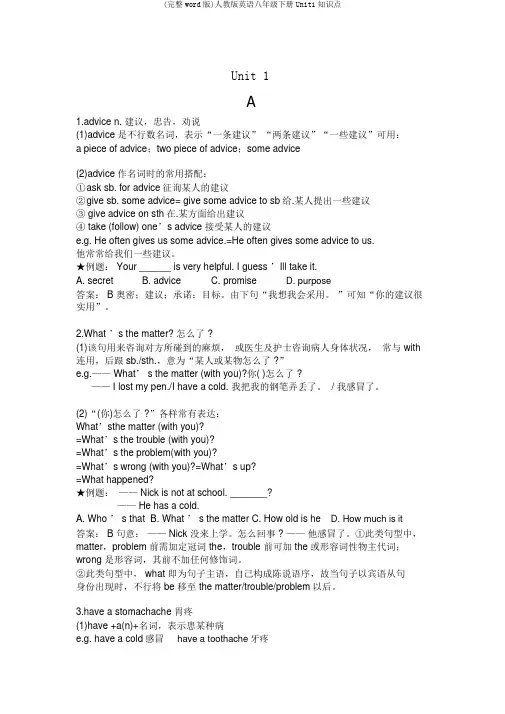
Unit 1A1.advice n. 建议,忠告,劝说(1)advice 是不行数名词,表示“一条建议”“两条建议”“一些建议”可用:a piece of advice;two piece of advice;some advice(2)advice 作名词时的常用搭配:①ask sb. for advice征询某人的建议②give sb. some advice= give some advice to sb给.某人提出一些建议③ give advice on sth在.某方面给出建议④ take (follow) one’s advice 接受某人的建议e.g. He often gives us some advice.=He often gives some advice to us.他常常给我们一些建议。
★例题: Your ______ is very helpful. I guess ’Ill take it.A. secretB. adviceC. promiseD. purpose答案: B 奥密;建议;承诺;目标。
由下句“我想我会采用。
”可知“你的建议很实用”。
2.What ’s the matter? 怎么了 ?(1)该句用来咨询对方所碰到的麻烦,或医生及护士咨询病人身体状况,常与 with 连用,后跟 sb./sth.,意为“某人或某物怎么了 ?”e.g.—— What’ s the matter (with you)?你( )怎么了 ?—— I lost my pen./I have a cold. 我把我的钢笔弄丢了。
/ 我感冒了。
(2)“(你)怎么了 ?”各样常有表达:What’sthe matter (with you)?=What’s the trouble (with you)?=What’s the problem(with you)?=What’s wrong (with you)?=What’s up?=What happened?★例题:—— Nick is not at school. _______?—— He has a cold.A. Who ’ s thatB. What ’ s the matterC. How old is heD. How much is it答案: B 句意:—— Nick 没来上学。
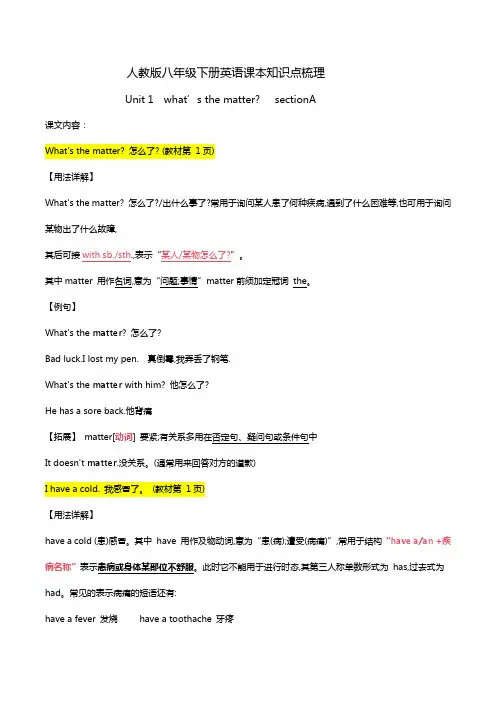
人教版八年级下册英语课本知识点梳理Unit 1 wh at’s the matter? sectionA课文内容:What's the matter? 怎么了? (教材第1页)【用法详解】What's the matter? 怎么了?/出什么事了?常用于询问某人患了何种疾病,遇到了什么困难等,也可用于询问某物出了什么故障,其后可接with sb./sth.,表示“某人/某物怎么了?”。
其中matter 用作名词,意为“问题;事情”matter前须加定冠词the。
【例句】What's the matter? 怎么了?Bad luck.I lost my pen. 真倒霉,我弄丢了钢笔.What's the matter with him? 他怎么了?He has a sore back.他背痛【拓展】matter[动词] 要紧;有关系多用在否定句、疑问句或条件句中It doesn't matter.没关系。
(通常用来回答对方的道歉)I have a cold. 我感冒了。
(教材第1页)【用法详解】have a cold (患)感冒。
其中have 用作及物动词,意为“患(病);遭受(病痛)”,常用于结构“have a/an +疾病名称”表示患病或身体某部位不舒服。
此时它不能用于进行时态,其第三人称单数形式为has,过去式为had。
常见的表示病痛的短语还有:have a fever 发烧have a toothache 牙疼have a headache头痛have a cough 咳嗽have a stomachache胃痛Do you often have a cold? 你经常感冒吗?Jim had a stomachache after supper yesterday.吉姆昨天晚饭后胃痛。
l have a stomachache.我胃痛。
( 教材第1 页)【用法详解】stomachache [名词]胃痛;腹痛是由“名词stomach(;腹部)+ache(疼痛)”构成的复合名词。
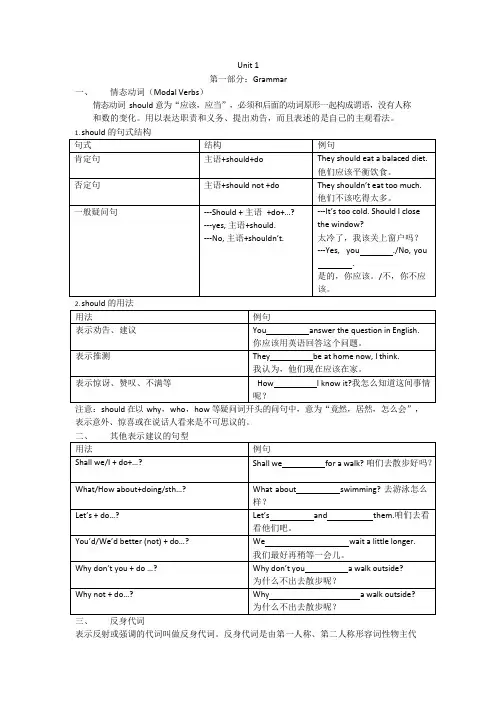
Unit 1第一部分:Grammar一、情态动词(Modal Verbs)情态动词should 意为“应该,应当”,必须和后面的动词原形一起构成谓语,没有人称和数的变化。
用以表达职责和义务、提出劝告,而且表述的是自己的主观看法。
注意:should 在以why,who,how 等疑问词开头的问句中,意为“竟然,居然,怎么会”,表示意外、惊喜或在说话人看来是不可思议的。
三、反身代词表示反射或强调的代词叫做反身代词。
反身代词是由第一人称、第二人称形容词性物主代词或第三人称代词的宾格形式,词尾加self 或selves 组成。
反身代词可译“本人”、“本身”,为加强语气,也常翻译为“亲自”、“自己”。
不定人称代词one ---- o neself.第二部分:单词用法Section A1.What’s the matter?怎么了?该句常用询问某人患了何种疾病或遇到了什么麻烦,其后用with 引出对象。
1). What’s the matter with sb.?=what’s wrong with sb.?=what’s the trouble/problem with sb.?=what’s one’s trouble/problem?e.g. What’s the matter w ith Tom?=what’s with Tom?=What’s the with Tom?=What’s Tom’s?2). matter, 名词,“问题,事情”e.g. We have important (matter) to discuss.我们有些重要的问题要讨论。
3). 动词,“要紧,关系重大”e.g. It dosen’t that you came late.2.I have a cold. 我感冒了。
1).have/get/catch a cold “感冒,着凉”The old man a cold yesterday.那位老人昨天感冒了。
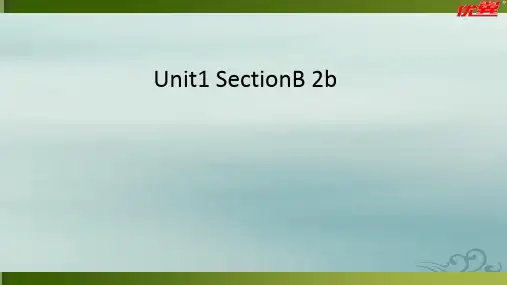
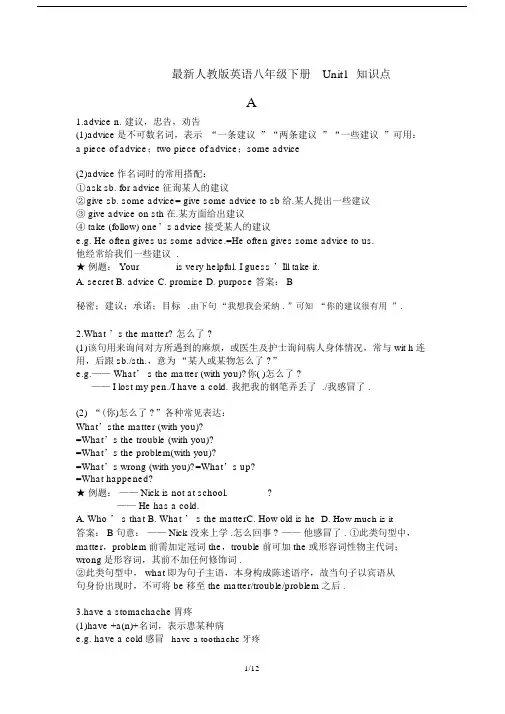
最新人教版英语八年级下册Unit1 知识点A1.advice n. 建议,忠告,劝告(1)advice是不可数名词,表示“一条建议”“两条建议”“一些建议”可用:a piece of advice;two piece of advice;some advice(2)advice作名词时的常用搭配:①ask sb. for advice征询某人的建议②give sb. some advice= give some advice to sb给.某人提出一些建议③ give advice on sth在.某方面给出建议④ take (follow) one’s advice接受某人的建议e.g. He often gives us some advice.=He often gives some advice to us.他经常给我们一些建议 .★例题: Your ______ is very helpful. I guess ’Ill take it.A. secretB. adviceC. promiseD. purpose 答案: B秘密;建议;承诺;目标.由下句“我想我会采纳 . ”可知“你的建议很有用”.2.What ’s the matter? 怎么了 ?(1)该句用来询问对方所遇到的麻烦,或医生及护士询问病人身体情况,常与 wit h连用,后跟 sb./sth.,意为“某人或某物怎么了 ?”e.g.—— What’ s the matter (with you)?你( )怎么了 ?—— I lost my pen./I have a cold. 我把我的钢笔弄丢了 ./我感冒了 .(2)“(你)怎么了 ?”各种常见表达:What’sthe matter (with you)?=What’s the trouble (with you)?=What’s the problem(with you)?=What’s wrong (with you)?=What’s up?=What happened?★例题:—— Nick is not at school. _______?—— He has a cold.A. Who ’ s thatB. What ’ s the matterC. How old is heD. How much is it答案: B 句意:—— Nick 没来上学 .怎么回事 ? ——他感冒了 . ①此类句型中,matter,problem前需加定冠词 the,trouble前可加 the或形容词性物主代词;wrong是形容词,其前不加任何修饰词 .②此类句型中, what即为句子主语,本身构成陈述语序,故当句子以宾语从句身份出现时,不可将 be移至 the matter/trouble/problem之后 .3.have a stomachache胃疼(1)have +a(n)+名词,表示患某种病e.g. have a cold感冒have a toothache牙疼have a fever have a headache疼拓展: sore与 pain也可用于表示疾病的短e.g. have a sore throat(back/knee⋯)嗓子疼 (背疼 /膝盖疼⋯)have a pain in the back(foot/knee⋯)背疼 (脚疼 /膝盖疼 )(2)stomachache可数名,意“胃疼;腹疼”,是由名 stomach(胃;腹部 )加ache(疼痛 )构成的复合名 .“身体部位 +ache”构成疾病名称headache疼toothache牙疼backache背疼★例:—— Mom ,I _____.—— I ’ m rryso to hear that, dear. We must go to see the dentist right away.A.have a headacheB. have a stomachacheC. have a toothache答案: C由下文“dentist可知”孩子牙疼.4.foot n. 脚foot作可数名用,其复数形式是feet.e.g. This kind of animal has four feet. 种物有四只脚 .(1)与foot复数的化形式相似的有:tooth-teeth牙 goose-geese(2)on foot步行,固定短,相当于walk.e.g. We came here on foot.=We walked here我.走着来儿的 .5.fever n.e.g. Tom has a fever. 姆了 .(1)have a fever=have a temperature=run a fevere.g. I had a temperature last night昨.晚我了 .★例: Nancy took her temperature and found she had a _____.A. coughB. toothacheC. coldD. fever答案 :D由上文“南希量了一下体温”可知她了.(2)拓展: have a high temperature/fever高6.lie v. 躺,平躺(1)lie的各种含:①lie v. 躺,位于,平放lay-lain-lyinge.g. You should lie down.你躺下 .His school lies in the north of the city.他的学校位于城北 .② lie v. lied-lied-lyinge.g. He often lies.他常③lie n. 言 lies(复数 )e.g. He often tells lies.他常 .★例: Look, there is a wallet _____ on the playground.A. lieB. lyingC. layD. lain答案 :B There be⋯ doing sth.固定句式, lie躺,位于,平放,其在分是lying.(2)拓展: lay v. 下蛋,放置e.g. The hens lay a lot of eggs every day母.每天下很多蛋 .Please lay the table before dinner. 前好餐具 .7.rest v. & n. 放松;休息(1)rest作及物,意“使休息”,作不及物,意“休息”.e.g. You should rest your eyes after a lot of reading.在大量之后,你休息一下你的眼睛 .I’m tired,and I want to rest.我累了,我想休息 .(2)rest也可以作名, have/take a rest=have/take a break,意“休息一下”.e.g. Students have a rest/break after each lesson学生.每后都休息一下.8.feel v. 摸起来(1)feel常用作系,其后跟形容作表.其主要用法有:①表示某物摸起来人的感,通常要以被摸之物作主,不可用于行.e.g. Your hand feels cold你.的手摸起来很凉 .Silk feels soft and smooth. 摸起来柔平滑 .②表示某人的感,以人作主,可用于行.e.g. I feel fine./I’m feeling fine. 我感良好 ./我在感良好 .(2):常用的感官:feel摸起来, look 看起来, sound听起来, taste起来,smell起来 .(3)拓展: feel like +n. 意“摸起来像⋯”e.g. This wallet feels like leather. 个包摸起来像是皮的.★ 例:A. soundsB. tastesC. feelsD. smells答案: C句意:床摸起来柔而且舒服.9.without prep. 没有,缺乏(1)without 后接名、代格或v.-ing作,其反 with.e.g. We got there without any trouble.我到了那儿,一路上没遇到任何麻.Can you finish your homework without him?没有他你能完成你的家庭作?She left the room without saying a word.她一句没有就离开了房.★例: The “ teacher-free exam ” means thattudents take their exams _____ teachers. Students must be more honest.A. withoutB. againstC. throughD. by答案: A没有;反;通;被 .由后句“学生必更加”,可知“teacher-freeexam”意思是没有老考的.(2)拓展: without 用于否定句,可以表示条件,意“如果没有”,相当于 if 引的否定条件句 .e.g. We couldn’tlive without air.=We couldn ’tlive if there weren’tair.如果没有空气,我就不能活.★例: W______ your help,I couldn’thave passed the exam.答案 :Without句意:如果没有你的帮助,我不能通考.10.hurt v. ( 使 )疼痛;受(1)hurt-hurt(去式 )-hurt(去分 )(2)hurt作及物,表示“使疼痛,受;使不快”,后接 .e.g. You hurt her feelings because you forgot her birthday.你了她的感情因你忘了她的生日.A boy hurt himself in P.E. class一.个男孩在体育上着自己了.(3)hurt作不及物,表示“感到疼痛”.e.g. My feet hurt. 我脚疼 .11.⋯when the driver saw an old man lying on the side of the road.⋯⋯,就在此司机看到一位老人躺在路 .(1)when引状从句,除常常有“当⋯ ”之意外,放在去行构成的主句之后,以“就在此 /那;突然”相当于 at this/that time.e.g. He was just getting into the shower when the telephone rang.他正要去沐浴, (突然 )响了起来 .★例: They were playing soccer on the playground _______ the storm came.A. as soon asB. as long asC. whenD. while答案 :C句意:他正在操上踢足球,暴雨来了.表示某一个作正在行,另一个作突然生,用when,意“在那”.(2)辨析:①see sb. doing sth看.某人正在做某事 (看作正在行 )e.g. I saw him playing the piano in the music room just now.我看他正在音室琴.② see sb. do sth看.某人做某事 (看作全程或常性的作)e.g. I often see him play basketball after school.我常看他放学后打球.(3)拓展: v. +sb. +doing/do的常:一感 (feel),二听 (listen to, hear),四看 (see, look at, watch, notice)★例 1:I see there two boys _____ (pass) my house every day.答案 :pass 句意:每天我都会看两个男孩我的房子 .see sb. do sth.意“看某人做某事”例 2:—— I tried to make Alice _____ her mind but I found it difficult.—— Well,I saw you _____ that when I went past.A. changed; doB. changes; doingC. change; to doD.change; doing答案 :D句意:——我尽力使艾斯改她的主意,但我很.——哦,但我的候,我看到你正在那做 .make sb. do sth.使某人做某事; see sb. doing sth.看某人正在做某事 .12.get off下(1)get off 的反短是 get on 上“ ”.e.g. Don’tget on the No.8 bus不.要上 8路公交 .He got off at Guangming Road他.在光明路下了 .(2)拓展: get的相关短:get up起床get on登上 (公共汽、火等 )get off下(公共汽、火、机)get in入 (小汽、出租 )get out of从 (小汽、出租等 )下来★例: Steven,we should _____ the bus at the next stop.A. get upB. get offC. get toD. get in答案 :B句意“斯蒂文,我在下一站下”.13.to one’s surprise某人吃惊的是e.g. To his surprise,the plan succeeded. 他吃惊的是,那个划成功了. surprise及其派生的相关用法:①surprise surprise sb.e.g. I don’twant to surprise her我.不想她惊 .②surprise 名 to one’s surprise,give sb. a surprise, in surprisee.g. Let’s give Mom a surprise!咱一个惊喜吧 !③surprising 形容常修物e.g. What surprising news!多么令人惊的消息呀 !④surprised 形容常用人作主, be surprised at sth,.be surprised to do sth,.be surprised that⋯e.g. I was surprised at the news我.个消息感到意外 .⑤surprisingly 副e.g. She looked surprisingly well.她看上去身体出奇地好 .★例:—— How was your life in England?—— Quite different from here. _____ , people there drink tea with milk. A. In my opinion B. To my surprise C. At the beginning答案 :B在我看来;使我吃惊的是;at the beginning(of ⋯ )在 (⋯的 )开始 .由境可知,使我吃惊的是人喝茶加牛奶.14.trouble n. ;苦trouble常用作不可数名,相当于difficulty ,意“困;苦”,常用短及句式:(1)get (sb.) into trouble意为“(使某人 )陷入困境”.e.g. If I don’tclock in before 9, I’ll get into trouble!我要是 9点前没有上班打卡,我就会遇到麻烦的.(2)be in trouble意为“陷入困境中”.e.g. Now he is in trouble, we should go all out to help him.现在他遇到了麻烦,我们应该全力以赴去帮助他.(3)have trouble/difficulty/problems with sth.=have trouble/difficulty/problems (in)doing sth.表示“做某事有困难”.e.g. His son had trouble climbing up the hill.他儿子爬这座山很困难 .(4)What’s the trouble (with you)? (你)怎么了 ?★例题:—— Sally is my best friend. She is always there whenever I___.’ m __—— Yeah. A friend in need is a friend indeed.A. in orderB. in troubleC. in public答案 :B按顺序;深陷困境;在公共场合 .根据最后一句“患难中的朋友才是真正的朋友”可知每当“我”身陷困境时,朋友总是在帮助“我”.(5)拓展: trouble动词,表示“使烦恼,使忧虑;麻烦”. e.g.Could I trouble you to open the door?能麻烦你开一下门吗 ?15.hit v. (用手或器具 )击;打(1)hit-hit( 过去式 )-hit( 过去分词 )-hitting( 现在分词 )e.g. The boy hit the dog with a stone那.男孩用一块石头打那只狗 .(2)hit后接人或物的部位时,常用如下结构: hit sb./sth. on/in +部位e.g. She hit him on the head with her umbrella她.用雨伞打他的头 .注意:打在人体硬部位上用用介词 on,软部位上用介词 in,且结构中的定冠词通常不可用物主代词代替 .★例题: Don’t play near the window. The broken glass may _______ ______________ ________ ________打(到你的头 ).答案: hit you on the head.16.right away 立即;马上right away的同义词和同义短语分别是immediately和right now/at once.e.g. He set off right away hearing the news听.到那个消息,他立即动身了.★例题: My father will leave for England at once.A. right awayB. at timesC. on timeD. just now答案: A 马上;有时;按时;刚才.句意:我父亲将马上离开去英国.B1.take⋯to⋯⋯去⋯e.g. Don’tworry. I will take you to the bus stop.担心,我将你去公共汽站.(1)辨析:① bring来 (到人的地方 )e.g. Remember to bring your homework to school tomorrow.得明天把你的作到学校来.② take拿走 (拿到离人的地方)e.g. Please take the books to the classroom.把些拿到教室去 .③carry扛,搬 (任何方向 )e.g. Please carry the bag to my office.把个袋子扛到我公室.④ fetch去取来,去拿来 (往返取物 )e.g. Don’tworry. I can fetch the key.着急,我能把匙拿来.★例: My parents usually ______ me ______ that park when I was young. We always enjoyed ourselves there.A. took ; toB. fetched;fromC. brought;toD. carried; from答案 :A从到的地方;去⋯⋯ 取⋯⋯;从到人的地方;从⋯⋯ 搬⋯⋯.(2)take的其他常用含:①take表示“乘坐某一交通工具”.② take表示“花”,常用句型:It takes/took sb. some time to do sth做.某事花某人多少.③ take意“ ”,当决定要某物品,可以“I’ll take it/them.”.④take表示“吃喝” ,与 eat,drink ,have意思相近;但表示“吃” ,通常只用 take.2.be used to doing⋯于做⋯e.g. He is used to getting up early他.于早起 .辨析:①g“ 于做⋯”前者状;后两者的程,其中 to介,后接名 doing.e.g. He has been used to walking to school.他已于步行去上学.② used to do “去常常”,后接原形 .e.g. He used to go to work on foot.他去常常步行上班 .③be used to do/for doing 被用于“做⋯”是被 .e.g. He used his knife to cut off his arm.=His knife was used to cut off his arm.他用刀子砍掉了他的胳膊.★例 1:I used to _____ newspapers and watch TV after dinner. But now’mI used to _____ a walk.A. read;takeB. read;takingC. reading;takingD. reading; take答案 :B used to do sth.意“ 去常做某事”; be used to doing sth.意“ 于做某事”句.意:我去晚后常常和看,但是在我散步 .例 2:—— Do you know what a writing brush is?—— Yes. It’s used _____ writing and drawing.A. withB. toC. forD. by答案 :C be used for被用来做⋯,be used by sb被.某人使用 .3.run out 用尽;耗尽e.g. After a long walk,he ran out of his water. 途跋涉后,他用尽了他的水.辨析:① run out是“ +副”型短,主通常是、食物、金等名.e.g. His money soon ran out他.的很快花完了 .② run out of作及物用 (=use up),后接,主通常是人 .e.g.I have run out of my money before payday.在工的日子之前我已用尽了我的 .注意: run out of⋯其愿意“从⋯中跑出”.e.g. Lots of students ran out of the classroom to see what had happened.很多学生从教室里跑出来看看生了什么事 .★例: I will go to buy some paper. My paper has _____.答案 :C出去;出版,出来;用完,耗尽;当心.句意:我要去些,我的用完了 .4.So he used his knife to cut off half his right arm.所以他用刀子将他的右臂切去了一半 .(1)knife用作名,意“小刀”,其复数形式 knives.似有:wife → wives妻子wolf → wolves 狼thief→ thieves shelf → shelves架子life→ lives生命half → halves一半leaf→ leaves叶(2)cutoff 意“切除,切断”,是由“ +副”构成的短 .后跟代,代放于c ut和 off之 .8/12cut up切碎cut down砍倒cut in line插cut⋯in two/half 把⋯切成两半cut⋯ into pieces把⋯切成碎片5.so that以便,了(1)so that引目的状从句,从句常用情may/might/can/could等.e.g.We went early so that we could get good seats. 了占到好座位,我早早就去了.★例: I looked through my test paper again and again _____ I wouldn’tmake any mistakes.A. soB. becauseC. so that答案 :C因此;因;了句意:了不会出,我把卷了一遍又一遍.(2)so that引目的状从句,当主句主与从句主一致,可用“ soas to (in order to)+原形” 化句 .e.g. He got up early so that he could catch the early bus.=He got up early in order to/so as to catch the early bus. 了赶早班公交他起床很早 .(3)so that可以与 in order that互 .e.g. He worked day and night so that/in order that he could succeed.他夜以日地工作的是成功.(4)so⋯that⋯表示“如此⋯以至于⋯”引果状从句 .e.g. The boy is so young that he can’tgo to school.个男孩太小不能去上学.6.mean v. 意思是;打算;意欲(1)mean用作,意“意思是”,后面可以跟 that从句 .e.g. Do you mean that it’s none of my business?你的意思是它与我无关?(2)拓展:①mean名形式 meaning,意“含;意思”,常用句型: What’s the meaning of⋯ ?.句型可与 What does/do⋯ mean?行同句 .e.g. What’s the meaning of the word?=What does the word mean?个是什么意思 ?②mean to do⋯打算做⋯e.g. I mean to go tomorrow,but my father will not allow me to.我打算明天去,但我父不会允我去.③mean doing⋯意味着做⋯e.g. Doing that means wasting time.做那件事意味着浪.7.decision n. 决定;抉decision常用于短 make a decision/decisions意“作决定”.make a decision to do sth.=decide to do sth.=make up one’s mind to do sth.决定做某事 .e.g. He made a decision/decided to go to New York finally最.后他决定去 .★例: It was very hard for me to make a,but I decided to leave my job. A. invitation B. decision C. plan D. discussion答案 :B邀;决定;划;.句意 :于我来做出决定很,但我决定辞.8.control n.& v. 限制;束;管理(1)be in control of固定短,意“管理;掌管”.e.g. A teacher must be in control of his class老.必掌控好自己的堂.Who’sin control of the project?是个目的人 ?(2)拓展 :control的其他相关短:under control在控制之下out of control 失去控制e.g. Everything is under control.一切在控制之下 .★例: The car was out of _____ and hit a tree by the road.A. dangerB. breathC. controlD. practice答案 :C out of danger脱离危; out of breath上气不接下气; out of cont失控; out of practice疏于 .9.keep on doing⋯、重复做⋯e.g. Don’tkeep on interrupting me.老是跟我打岔 .(1)句型:①keep doing sth一.直做某事e.g. Keep smiling.保持微笑 .②keep sb. doing sth. 某人一直做某事e.g. I’m sorry to keep you waiting.不起你久等了 .③keep on doing sth./重复做某事e.g. He kept on sitting down and standing up他.重复坐下又站起来 .(2)英中后接 doing作的 ( ):完成得忙 finish, practice,be worth,be busy 放弃 keep on, be used to,give up考建不禁想 consider,suggest,can’thelp,feel like 喜思念要介意 enjoy, miss,mind10.because of⋯由于⋯(1)辨析:①because接从句e.g. He is absent because he is ill today他.今天缺席,因他病了.② because of接名,代或名e.g. He is absent today because of his illness他.今天缺席,因他病了.★例: We didn’thave a sports meeting yesterday _____ the heavy rain.A. becauseB. unlessC. because ofD. across from答案 :C句意:因下大雨,昨天我没有开运会.介 of之后跟名 .(2)because(因为 )和 so(所以 )不能同时出现在一个英语句子中,只用其一,类似的词还有 although(虽然 )和 but(但是 ).e.g. Although he was tired,he still worked hard.=He was tired,but he still worked hard.虽然他很累了,但他仍然努力工作.11.give up放弃(1)后接名词、代词或动词-ing形式 .e.g. You shouldn’tgive up running.你不应该放弃跑步 .★例题: You should _____ smoking. It’s really bad for your health.A. put upB. give upC. get upD. set up答案 :B搭建;放弃;起床;建立 .句意 :你应该放弃吸烟吸烟真的有害身体健康.(2)up在此短语中是副词,故give up与代词连用时,代词需放中间.e.g. I find it too difficult to learn English well. I want to give it up.我发现学好英语很难 .我想放弃它 .(3)拓展 :give其他相关短语:give away赠送give back归还;恢复give in 屈服give off 发出;放出give out分发12.情态动词 should 的用法(1)should 应“当,应该”,表示义务、责任,后接动词原形,且无人称和数的变化,否定形式为 shouldn’t.e.g. You should obey the school rulers我.们应该遵守学校的规则.You shouldn’tdo that.你们不应该做那件事 .★例题:—— Many people play with mobile phones all day instead of reading books.—— That ’oost bad. Everyone _____ be a book lover. Reading is more enjoyable.A. mayB. shouldC. would答案 :B可能;应该;会.句意:每个人应当成为书的爱好者.读书跟快乐 .(2)用于征求对方的意见, should表示“应当;应该”此.时,一般用于第一人称的一般疑问句或特殊疑问句中 .e.g. Should I help her clean the park?我应该帮她打扫公园吗 ?What should I do for them?我应该为他们做些什么 ?13.反身代词反身代词是由第一人称、第二人称形容词性物主代词或第三人称人称代词宾格形式,词尾加 -self或 -selves组成的 .反身代词意为“本人”、“本身”,为加强语气,也可翻译为“亲自”、“自己”.(1)反身代词构成:第一人称第二人称第三人称单数myself yourself himself/herself/itself 复数ourselves yourselves themselves(2)反身代词的用法:①作动词宾语或介词宾语e.g. The boy can dress himself这.个男孩能给自己穿衣服.Take good care of yourself好.好照你自己 .②作主或的同位e.g. Mrs. Black herself is a lawyer布.莱克夫人本人就是一名律 . You had betterask the driver himself你.最好司机本人 . ③作表e.g. Just be yourself做.你自己就好了 .Mary hasn’tbeen herself recently. 近来感到不适 .(3)反身代必与其所指代的名或代形成相互关系,在人称,性和数上保持一致 .e.g. The children are enjoying themselves in the park孩.子正在公园里玩得很高.★例: They could look after _____ when they were six.A. ourselvesB. themselvesC. yourselves答案 :B句意:当他六就能照自己了.主 they,反身代 themselves.(4)反身代的常用短:teach oneself=learn by oneself自学enjoy oneself得愉快help oneself to⋯随便吃 /用⋯look after oneself照某人自己dress oneself自己穿衣服★例:—— Kate,I ’ m going to business. Please look after ellw.—— Don’tworry ,Mom. I will.A. youB. yourC. yourselfD. yourselves答案 :C your是形容性物主代,不能独作,故排除;look after yourself照你自己 .。
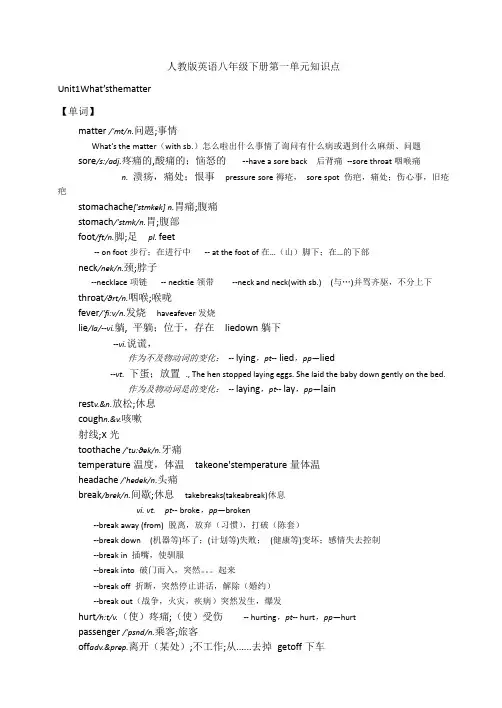
人教版英语八年级下册第一单元知识点Unit1What’sthematter【单词】matter /'mt/n.问题;事情What’s the matter(with sb.)怎么啦出什么事情了询问有什么病或遇到什么麻烦、问题sore/s:/adj.疼痛的,酸痛的;恼怒的--have a sore back 后背痛--sore throat咽喉痛n. 溃疡,痛处;恨事pressure sore褥疮,sore spot 伤疤,痛处;伤心事,旧疮疤stomachache['stmkek] n.胃痛;腹痛stomach/'stmk/n.胃;腹部foot/ft/n.脚;足pl. feet-- on foot步行;在进行中-- at the foot of在…(山)脚下;在…的下部neck/nek/n.颈;脖子--necklace项链-- necktie领带--neck and neck(with sb.) (与…)并驾齐驱,不分上下throat/θrt/n.咽喉;喉咙fever/'fi:v/n.发烧haveafever发烧lie/la/--vi.躺, 平躺;位于,存在liedown躺下--vi.说谎,作为不及物动词的变化:-- lying,pt-- lied,pp—lied--vt. 下蛋;放置., The hen stopped laying eggs. She laid the baby down gently on the bed.作为及物动词是的变化:-- laying,pt-- lay,pp—lainrest v.&n.放松;休息cough n.&v.咳嗽射线;X光toothache /'tu:θek/n.牙痛temperature温度,体温takeone'stemperature量体温headache /'hedek/n.头痛break/brek/n.间歇;休息takebreaks(takeabreak)休息vi. vt.pt--broke,pp—broken--break away (from) 脱离,放弃(习惯),打破(陈套)--break down (机器等)坏了;(计划等)失败;(健康等)变坏;感情失去控制--break in 插嘴,使驯服--break into 破门而入,突然。
人教版八年级下册英语Unit 1单元语法知识点总结本单元重点短语的具体用法1. have a fever/cough/toothache/cold:表示患有某种疾病或不适,例如:- I have a fever and a cough. 我发烧并咳嗽。
- She has a toothache and needs to see a dentist. 她牙疼,需要看牙医。
- I caught a cold and had to stay in bed. 我感冒了,不得不卧床休息。
2. see a dentist:看牙医,例如:- If you have a toothache, you should see a dentist. 如果你牙疼,应该去看牙医。
3. get an X-ray:拍 X 光片,例如:- The doctor suggested that I get an X-ray to check my lungs. 医生建议我拍个 X 光片检查肺部。
4. take one's temperature:量体温,例如:- The nurse took my temperature to see if I had a fever. 护士给我量了体温,看我是否发烧。
5. lie down:躺下来,例如:- You should lie down and rest if you feel sick. 如果你感觉不舒服,应该躺下来休息。
6. take breaks:休息,例如:- It's important to take breaks and relax during the day. 在一天中休息和放松很重要。
7. in the same way:以同样的方式,例如:- We solved the problem in the same way as the teacher showed us. 我们用老师教我们的同样方式解决了问题。
精品文档
精品文档
Unit1 What's the matter?名词:
matter 问题;事情 stomachache 胃痛;腹痛 stomach 胃;腹部 foot 脚;足 neck 颈;脖子 throat 咽喉;喉咙 fever 发烧 X-ray X射线;X光 toothache 牙痛 headache 头痛 break 间歇;休息 passenger 乘客;旅客 trouble 问题;苦恼 knee 膝盖 climber 登山者;攀登者 situation 情况;状况 kilo(=kilometer)千克;公斤 rock 岩石 knife 刀
blood 血
importance 重要性;重要
decision 决定;抉择
spirit 勇气;意志
death 死亡
nurse 护士
动词:
lie 躺;平躺 hurt (使)疼痛;受伤 hit (用手或器具)击;打
mean 意思是;打算;意欲
形容词:
sick 生病的;有病的 sore 疼痛的;酸痛的
代词:
herself 她自己 ourselves 我们自己
介词:
onto 向;朝
兼类词:
rest v&n 放松;休息 cough n&v 咳嗽 risk n&v 危险;风险;冒险
control n&v 限制;约束;管理
off adv&prep 离开(某处);不工作;从…去掉
短语:
have a cold 感冒 have a stomachache 胃痛 have a fever 发烧 lie down 躺下 take one's temperature 量体温 take breaks=take a break 休息
get off 下车
get on 上车
to one's surprise 使……惊讶的是
right away 立即;马上
精品文档
精品文档
get into 陷入;参与 take risks=take a risk 冒险 run out(of)用尽;耗尽
cut off 切除
get out of 离开;从……出来 be in control of 掌握;管理 give up 放弃
be used to doing sth 习惯于…;适应于…
used to do sth 过去常常做某事
知识点:
1、What's the matter?怎么了?
What's the matter with sb?某人怎么了?
询问某人或周围发生了什么事情
=What's wrong?=What's the trouble/problem?
例:—What's the matter?—I have a cold.
—What's the matter with him/Tom?—He failed the math exam.
2、have + a/an + 疾病名称 患……病
have a cold 感冒= get a cold=catch a cold have a cough 咳嗽 have a fever 发烧 have a toothache 牙痛 have a headache 头痛
have a backache 背痛
have a sore throat 喉咙痛
have a stomachache 胃痛
He has a cough. 他咳嗽了。
Tina had a fever yesterday. Tina昨天发烧了。
3、sore adj 疼痛的;酸痛的
Mike's legs are sore. Mike的腿疼。
have a sore + 身体部位 ……疼
have a sore throat 喉咙疼
have a sore back 背疼
have a sore foot 脚疼
Do you have a sore throat?你喉咙疼吗?
4、lie v 躺;平躺
lie down 躺下 He lied down and had a rest. 他躺下休息了。
lie in 坐落 My hometown lies in a valley. 我的家乡坐落在一个山谷里。
5、take breaks=take a break=have a rest 休息
We should have a rest. 我们应该休息一下。
精品文档
精品文档
It's a time to take a break. 该休息了。
6、have a + 名词:
have a look 看一看 have a talk 谈一谈
have a rest 休息一下 have a walk 散步
Let's have a walk. 我们散步去吧。
7、need to do sth 需要做某事
I need to clean my room. 我需要打扫我的房间。
He needs to do his homework. 他需要做作业。
needn't 不需要
You needn't do that. 你不需要做那些。
8、go to a doctor 去看医生
If you are ill, you should go to(see)a doctor. 如果你生病了,你应该去看医生。
9、get off 下车,从公交车/火车/飞机上下来
They got off the bus and walked away. 他们从公交车上下来走了。
get on 上车
She gets on the plane. 她上飞机了。
10、to one's + 情感名词 令某人……的是,使某人感到……的是
to one's surprise 令某人惊讶的是
to one's happiness 令某人高兴的是
To my surprise, they said okay!令我惊讶的是,他们说可以!
To her happiness, all her students passed the exam. 令她高兴的是,她的所有学生都通过了考试。
11、get into trouble 陷入困境
If you don't keep the rules, you will get into trouble. 如果你不遵守规则,你将陷入麻烦。
12、have problems/ trouble(in)doing sth = have problems/trouble with sth 做某事有困难
He has a lot of problems/ trouble in looking after the baby alone at home.
他一个人在家照顾孩子有很大困难。
Mary has problems/trouble with doing homework. 她做作业有困难。
13、动词 + up:
give up 放弃 cheer up 振作起来 put up 举起 get up 起床
set up 建立
grow up 长大
精品文档
精品文档
stay up 熬夜 wake up 醒来 look up 查阅
pick up 捡起
14、动词 + er/or = 名词,表示 从事某种职业的人
climb 爬 → climber 登山者 work 工作 → worker 工人 drive 驾驶 → driver 司机 teach 教 → teacher 教师 visit参观 → visitor 参观者
sing唱歌 → singer 歌手
invent发明 → inventor 发明家
15、should :情态动词 应该
(1)肯定句:主语 + should + 动词原形 + 其他
You should obey the traffic laws. 你应该遵守交通规则。
(2)否定句:主语 + should not + 动词原形 + 其他
You shouldn't go out alone at night. 你晚上不应该独自外出。
(3)一般疑问句:Should + 主语 + 动词原形 + 其他?
Should I open the door? 我应该打开门吗?
(4)特殊疑问句:特殊疑问词 + should + 主语 + 动词原形 + 其他?
When should we go?我们应该什么时候去?
16、反身代词:某人自己
人称
反身代词
单数 复数
第一人称 myself ourselves
第二人称 yourself yourselves
第三人称 himself/ herself/ itself themselves
by oneself 某人自己独自做 She does her homework by herself.
help oneself to sth 某人自便 Please help yourselves, children.
enjoy oneself 某人玩的开心 Please enjoy yourself, John.
teach oneself 自学 He teaches himself at home.
注意单复数!!